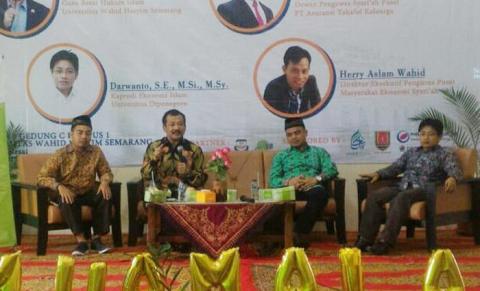Semarang, NU Online
The professor of Islamic Law University of Wahid Hasyim Semarang H Noor Ahmad said that sharia economic has been fully supported by the government. It can be proved by government policy that has released some regulations or rules by creating the National Committee of Sharia Finance (KNKS).
This statement was stated when he was a speaker at a national seminar entitled The Prospect and challenge sharia economic in the millennial eras which were held by Islamic Religious Faculty Wahid Hasyim University Semarang (Unwahas) at Auditorium C.3 Semarang Central Java on Wednesday (1/5).
“KNKS was a form of commitment from the government in the development of sharia economic and financial in Indonesia. Now, it depends on you as students and activists whether or not to take this role,” he, who was the first rector of Unwahas, stressed.
In the release that sent to NU Online, Friday (3/5), it was explained, the seminar was held by sharia economic law department (Muamalah) in collaboration with the student association of sharia economic law. The speakers were Professor Noor Ahmad, member of fatwa commission of Indonesia Ulema Council (MUI), academics of Diponegoro University Darwanto, and Executive Director of The Central Board of Sharia Economic Community (MES) Hery Aslam Wahid.
Hery Aslam said that the challenge of sharia economic is namely, limited human resource, low of sharia financial literacy, and sporadic sharia economic activities. “There is a need of a highly competent human resource of sharia economic. On the other hand, the educational institution has not been able to fulfill the need of human resources,” he said. The literacy of sharia economic is also still low. This problem becomes a corporate responsibility to increase the literacy of the community.
“What we can do is by utilizing information and technology that advance quickly,” he said.
Hary offers some concrete activities for the millennial generation among others are, socialization of sharia economic and financial, creation of an account of the sharia economic bank, investment at sharia market share, discussion about sharia economic and financial, making sharia as lifestyle, collaboration among the community, following competition and conference of sharia economic, and the last, attending academic study.
The seminar was followed by 200 students that represent sharia economic law programs throughout Central Java and Special Province of Yogyakarta (DIY). After the seminar, the participants continued with working meeting the Association of Sharia Economic Law (Ashesi) Central Java and DIY.
The meeting was attended by some of the lecturer faculty of Islamic religion (FAI) and opened by dean of FAI, H Nur Cholid. (Red: Muiz)
















